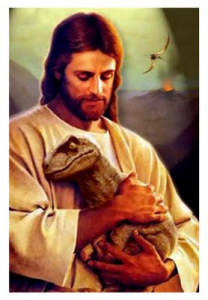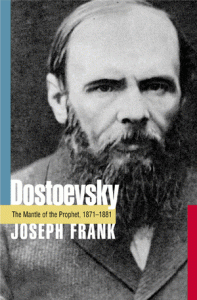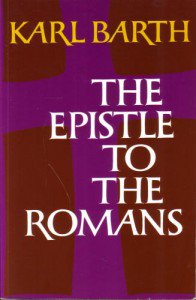
After writing a post on the Catholic imagination a bit of Protestant dialectics “If You’re Defending Absolute Truth, You’re Defending The Wrong Thing” dropped into my lap like a cuddly baby dinosaur.
In that previous post I cited the following passage from Mama Unabridged:
“Choosing to become Catholic has, in part, been a realization that the way I think and see the world is already deeply Catholic. While the Protestant imagination can be said to be dialectic, thinking in terms of either/or and stressing the unlikeness of things, the Catholic imagination is analogic — incarnational — seeing things in terms of likeness and unity, welcoming paradox. There is no schism between faith and reason, between the sacred and secular, between the natural and the numinous; God, the ground of all Being, inhabits each of these realms. All of reality is engraced.”
I am well aware that in his The Analogical Imagination: Christian Theology and the Culture of Pluralism David Tracy presents the analogical and dialectical imaginations as ideal constructs that don’t necessarily appear in pure form in reality. For example, think of George Weigel’s obsessive labeling of everything he sees, since the publishing of his book, as examples of “evangelical Catholicism.” I should add that Tracy also believes these two imaginations are complimentary rather than locked in combat. (Some blame Tracy’s irenicism for his inability to publish the much-awaited book on the doctrine of God he’s been writing for the last two decades.)
Then again, sometimes these theological imaginations do appear in pure form.
I frequently run across status updates on facebook from Protestant friends that sound like they’re in a foreign language I can speak, but not as a native speaker. That’s precisely how I felt when I first read Kierkegaard’s supremely dialectical Philosophical Fragments.
Below is a sample of dialectics from the “If You’re Defending…” post. Note how it is an example of “thinking in terms of either/or and stressing the unlikeness of things”:

“But like the Israel of Isaiah’s day, we suffer from an idolatry of faith that values theology and tradition more than people. We’re plagued by an idolatrous obsession over ideas that’s driven by a unquenchable need for control, a paranoid fear of the other, intense personal insecurity, and a pathological need to be right and have others recognize that we’re right.”
The author pulls the dialectics so far that he mirrors Dosteovsky’s famous (Protestant!) dichotomy between Christ and the truth. Here it is in the version cited in Joseph Frank’s Dostoevsky: The Mantle of the Prophet, 1871-1881:
“If someone proved to me that Christ is outside the truth and that in reality the truth were outside of Christ, then I should prefer to remain with Christ rather than with the truth.”
I believe the purest theological form of this sort of typically Protestant dialectical thinking can be found in Barth’s The Epistle to the Romans, which Catholic theologian Karl Adam called a “the bomb that fell on the playground of the theologians.”

Here’s Barth bombing away:
“The known plane is God’s creation, fallen out of its union with Him, and therefore the world of the flesh needing redemption, the world of men, and of time, and of things — our world. This known plane is intersected by another plane that is unknown — the world of the Father, of the Primal Creation, and of the final Redemption. The relation between us and God, between this world and His world presses for recognition, but the line of intersection is not self-evident.”
Can you see the difference now? Can you see how the dialectics in video Jesus > Religion might lead to a book that becomes a New York Times bestseller? Abandoning the world has unforeseen, but predictable, consequences for the world. Sometimes making God too transcendent of the world looks a lot like atheism. This is something that Michael Gillespie argues in The Theological Origins of Modernity.
Finally, in a totally awesome twist, the very same blog that did the “absolute truth” post also takes aim at the Jesus vs. Religion video. What’s more, it does so dialectically (see: this). If you’re keeping track that’s dialectics turning on dialectics dialectically.











